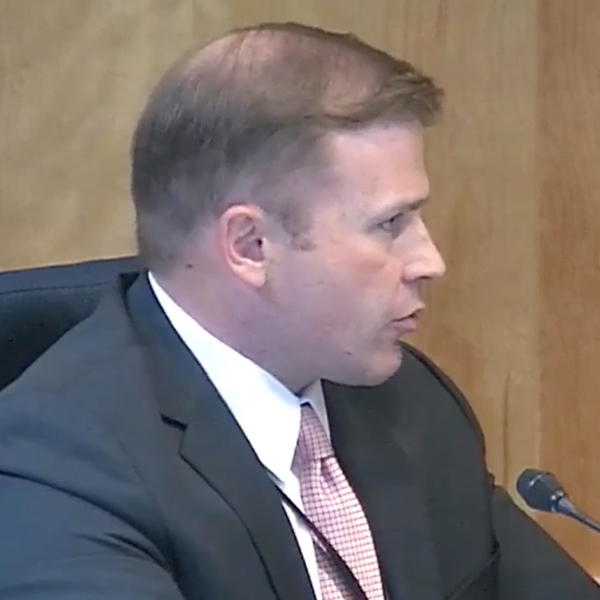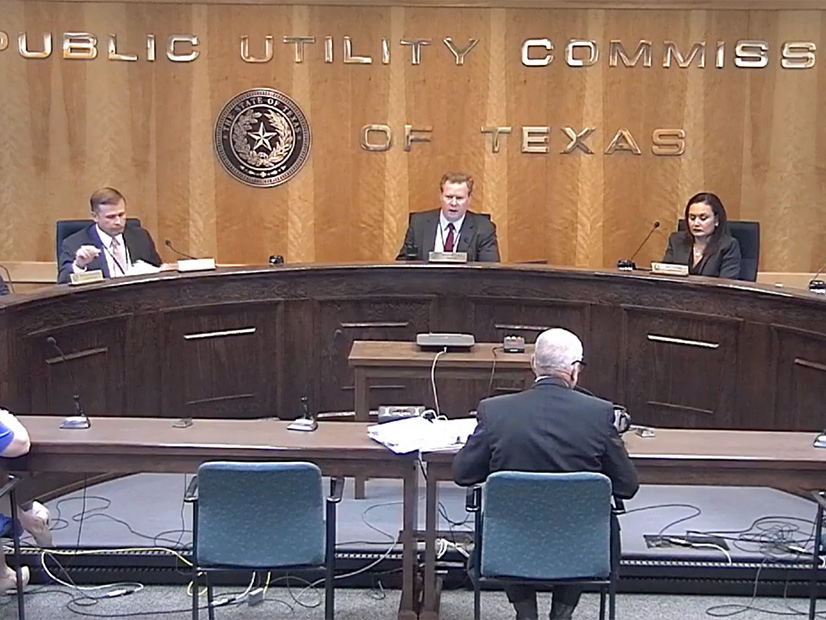Commission, Stakeholders Working to Streamline Battery Interconnection Process
Texas regulators last week said they are working with the electric industry to streamline interconnection processes for all resources at both the transmission and distribution levels.
 PUC Commissioner Will McAdams explains the issues facing battery-storage developers in bringing their resources to the grid. | Admin Monitor
PUC Commissioner Will McAdams explains the issues facing battery-storage developers in bringing their resources to the grid. | Admin Monitor
Public Utility Commissioners Will McAdams and Jimmy Glotfelty told their fellow regulators during Thursday’s open meeting that they will soon file “a framework that will serve as the building blocks of a strawman and set the parameters for discussion that all groups can agree on and move forward with.”
Their focus is mostly on interconnecting distribution-level battery storage systems. ERCOT only has 350 MW of distribution-side batteries on its system providing transmission benefits, McAdams said. However, according to the latest U.S. Energy Storage Monitor report from Wood Mackenzie and the American Clean Power Association, Texas accounted for 60% of the second quarter’s 2.98 GW of residential storage and grid-scale installations.
“This is trying to build a comprehensive grid where you have a firm grasp of the demand side and the supply side at both the transmission and — now — the distribution level … and trying to account for everything that we can bring to bear on the system for the purposes of reliability,” McAdams said.
“We need resources. We need resources at the transmission and distribution levels, and we’re going to get them whether we want them or not,” Glotfelty said. “We’re trying to give certainty to the distribution companies and their distribution customers, and we’re trying to give certainty to those who are investing private capital into our system on what they’re going to be paying today and in the future.”
Battery developers have been petitioning the PUC for more clarity, transparency and standardization, the commissioners said. McAdams said developers and utilities have made “great headway” working behind the scenes to develop a framework for a potential rulemaking or project.
At issue are processes and timelines, cost allocation and the use of dedicated feeders that may require rule changes in batteries that bid into the ancillary services markets.
McAdams told the commissioners that distributed energy resources are incented to interconnect on distribution systems because of substations’ spare capacity. DERs have found that is quicker than going through a separate transmission study process. Using substations as interconnection points also solves the issue of finding real estate in areas without transmission congestion and existing resources.
“It’s in the state’s interest to make it as easy as possible for these resources to come in at the locations that they’re applying for,” McAdams said.
DERs do not need to pay construction costs to interconnect to distribution systems. A PUC rule also designates batteries as pass-through resources in that they’re only charging and discharging and never actually producing power on the system.
“This is the industry coming together and coming up with the proposed rule,” Glotfelty said. “Everybody has a right to look at that and give us their input and have those discussions.”
Plant’s Conversion to Gas Approved
The PUC approved Southwestern Public Service’s (SPS) request to convert Harrington Generating Station’s three coal-powered units to natural gas and to build, own and operate a new gas pipeline (52485).
The conversion comes after a 2020 agreement between SPS and the Texas Commission on Environmental Quality to stop burning coal at the plant by 2025 after it violated the national ambient air quality standard for sulfur dioxide from 2017 to 2019. SPS determined that the best way to reach compliance was by converting the plant, which sits in the SPP footprint, to burn gas.
The West Texas plant’s continued operation will also help SPS meet SPP’s new 15% minimum reserve margin. The utility said full conversion also allows it to seamlessly maintain its existing interconnection rights at Harrington.
Harrington’s three boilers were designed to burn both coal and natural gas. The three units have a combined net capacity of 1,050 MW.
The conversion will cost $65 million to $75 million, and the $57 million needed to construct the pipeline will account for the bulk of the price tag. Texas customers will be allocated up to $53 million of the costs.
“This case disturbs me a little bit, but I have to be OK with it,” Glotfelty said. “I don’t like upgrading and changing fuels on a very old plant. I would hope in the future this could be … a new type of gas plant rather than a conversion of an old coal plant that uses old technology. But that’s not where we are today.”
The commission also approved an uncontested settlement, effective Oct. 15, in El Paso Electric’s rate request that will yield retail base-rate revenues of $35.69 million with a 9.35% return on equity. EPE had originally requested a $41 million rate increase (52195).
Interventions in Legal Dockets
The commissioners spent nearly two hours in executive session with their legal staff shortly after the meeting began. They then approved intervening in several ongoing dockets by:
- filing amicus briefs in ERCOT cases over its sovereign-immunity claims from lawsuits before the Texas Supreme Court involving CPS Energy (22-0056) and Panda Generation (22-0196);
- supporting a MISO and Edison Electric Institute motion at FERC to dismiss a complaint seeking to remove the grid operator’s compliance with state and local right-of-first refusal laws (EL22-78);
- supporting ERCOT’s position in any appeal of the adversary proceeding judgement in the Brazos Electric Power Cooperative bankruptcy case before the U.S. Bankruptcy Court for the Southern District of Texas (21-30725); and
- filing an amicus brief supporting ERCOT’s sovereign-immunity claims in Just Energy’s appeal of its bankruptcy case before the 5th Circuit Court of Appeals (22-20424).


